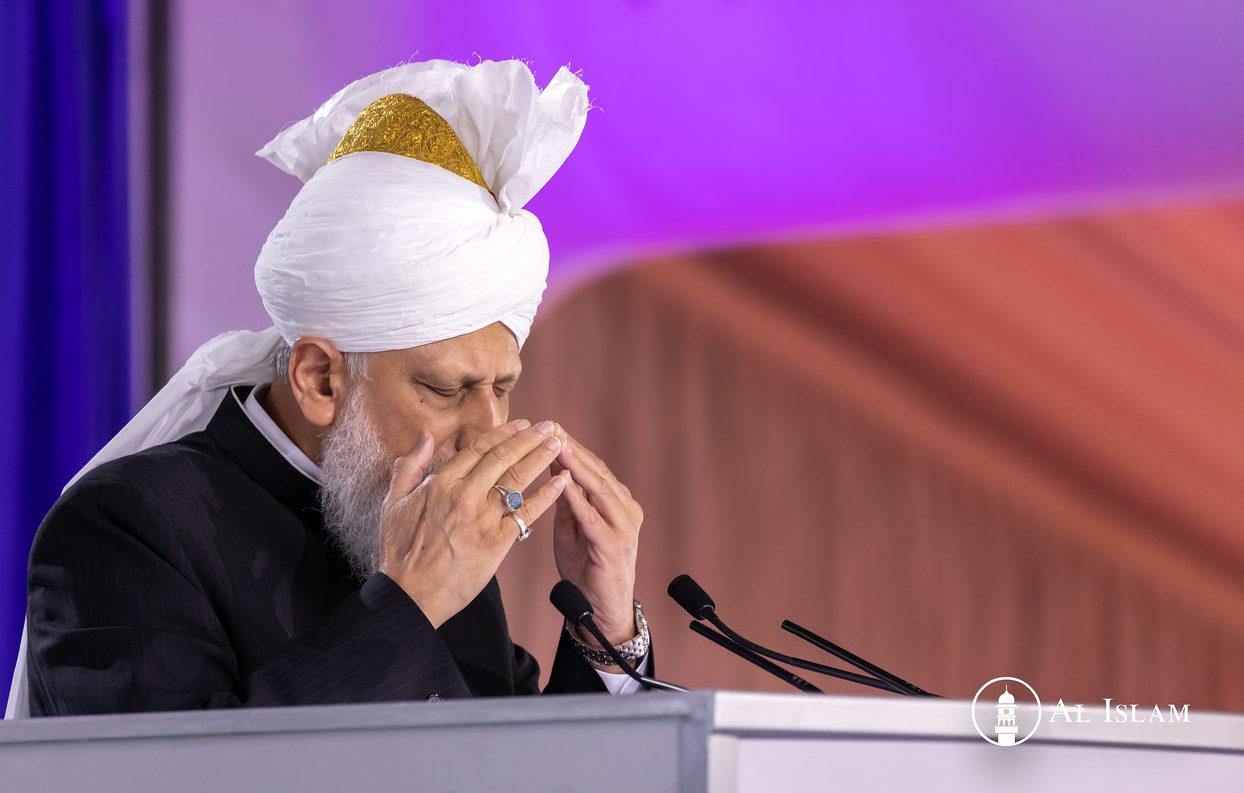AYSHA SALEEM, PALAKKAD
FEBRUARY 20, 2024
As a student, I often find myself searching for guidance and inspiration amid life’s twists and turns. There are a myriad of challenges one confronts when it comes to balancing academics, achieving personal growth, and pursuing a meaningful life. Often, it feels like we are navigating a maze without a map, seeking guidance and clarity in the face of uncertainty. In this quest, the life and teachings of Musleh Maudra emerge as a source of profound insight and counsel.
Hazrat Musleh Maud (the Promised Reformer), Mirza Bashiruddin Mahmud Ahmadra, the Second Caliph and the promised son of the Founder of the Ahmadiyya Muslim Community, was characterised by deep wisdom, unwavering faith and an insatiable quest for knowledge throughout his life. His teachings continue to inspire students around the world, offering invaluable guidance and timeless advice for managing the complexities of life and education.
In this article, I wish to explore the profound and timeless wisdom imparted by Hazrat Musleh Maudra that offers practical solutions to address the common problems faced by students. From managing stress to finding purpose, Musleh Maud’s insights provide a roadmap for overcoming obstacles and achieving success.
Essence of life and progress
Addressing the convocation ceremony of the Talim-ul-Islam College Lahore on 2 April 1950, Hazrat Mirza Bashiruddin Mahmud Ahmadra said:
“Human life goes through various changes, and these very changes become a source of making one’s life interesting. If these changes are removed from one’s life, it does not remain interesting anymore. … Hence, in fact, life is the name of change. No progress is possible without revolutions. In fact, progress can be defined as leaping forward gradually, meaning by passing through various pious changes.”[1]
Alignment with Divine attributes: A path to human progress
In the address, Hazrat Musleh Maudra commented on the Quranic verse 55:30-31 and said:
“The attributes of God Almighty continue to manifest themselves upon mankind in different aspects. Hence, obviously, mankind would also need to be harmonious with the [Divine] attributes that are being manifested at the time. … In short, the point that has been stated in the above-mentioned verses is that God Almighty manifests His attributes in a different state from time to time, and along with this change, mankind is also required to change themselves in accordance with the attributes of Allah the Almighty that are being manifested. In this way, mankind moves forward towards progress.”[2]
Significance of prayers and seeking Divine guidance
Hazrat Mirza Bashiruddin Mahmud Ahmadra then continued to talk about the importance of prayers and Istikhara (seeking guidance from God in a particular matter).
“The Holy Prophetsa has indicated this point through the prayers of Istikhara. No doubt, one reaps the fruit of their effort, however, it is a fact that inappropriate endeavour goes in vain. … It is possible for one to attain each and every knowledge and perform all kinds of duties, however, it is impossible for one to attain perfection in each and every field. It is only Allah the Almighty who is aware of one’s intellectual abilities, and it is He alone Who knows which of the beneficial sciences and useful works are appropriate for them, as per their own capabilities and the needs of their time, country, and nation. Therefore, [the Holy Prophetsa] stated that regardless of whatever good work one is performing, they must pray to Allah the Almighty before beginning.”[3]
Valuing time and organising goals
In one of his Friday sermons, Hazrat Mirza Bashiruddin Mahmud Ahmadra addressed the members of the Community, saying:
“A year is not just an ordinary thing. It is a year of twelve months and fifty-two weeks, in which there are seven days per week, twenty-four hours per day, and 60 minutes per hour. Each minute comprises 60 seconds, which can be further divided. Even a second is so valuable, that all the kings of the world cannot produce it even if they sell all their possessions. All the wealth, and possessions of the world cannot buy even a hundred thousandth of a part of it. … So, we should thank Allah profusely for having given us a valuable and extraordinary year.”[4]
Given how valuable our time is, it serves as a reminder of our need to progress and advance according to the change of time.
Nevertheless, in the hustle and bustle of daily life, it is easy to feel overwhelmed by the sheer volume of tasks demanding our attention. However, mastering the art of time management is essential for maintaining productivity and making tangible progress towards our aspirations. By diligently planning our days, organising tasks according to priority, and using our time efficiently, we create a framework that empowers us to stay focused and accomplish more.
On one occasion, Hazrat Musleh Maudra stated:
“We should keep a record of ourselves. For every year that comes, we should consider the coming year instead of looking at the last year. With every day we should consider that one day has now passed out of the 365 days, and how much work we needed to do. We should audit how much work we have completed and how much is left to do. If we start thinking this way, we can use our time efficiently, provided that we do so with great resolve.”[5]
In one of his Friday sermons, the Third Caliph of the Ahmadiyya Muslim Community, Hazrat Mirza Nasir Ahmadrh, reminded the Community of Hazrat Musleh Maud’s advice to create a structured plan so that they would always make progress. His Holiness said:
“Hazrat Musleh Maudra also repeatedly advised the Community in 1952 and on other occasions to be organised in their work. They should give their work a structured form and follow a schedule or plan. Otherwise, our progress will not be swift. … Thus, our efforts must be organised and follow a schedule or plan in continuing our struggle.”[6]
Sloth and self-doubt: Two enemies within
Hazrat Mirza Bashiruddin Mahmud Ahmadra said:
“A person should never be lazy; they must always stay active, and for that, some kind of exercise should be undertaken. For example, walking, etc. It has a deep connection to the soul. The Prophets never succumb to laziness.”[7]
Similarly, Hazrat Musleh Maudra warned against another destructive thought, saying:
“Never entertain the thought that such and such attributes are beyond your reach. There is not a single virtue, necessary for mankind, that they cannot acquire. While there may be varying levels, every quality exists within humans, and improvement is achievable through effort. Considering oneself incapable is a Satanic notion designed to distance individuals from virtue.”[8]
Efforts and prayers: Two essential elements
Hazrat Musleh Maudra explains that prayers are of two types: one that can be offered at any time, and the second that should be invoked only when one has exhausted all other options. He states:
“Imagine if a person asks for help, claiming to have nothing, but later money is discovered with him, how would he be treated? Similarly, a person who seeks God Almighty’s help without having utilised all his faculties is treated similarly—he incurs the wrath of God Almighty rather than His blessings.”[9]
His Holiness continues:
“Therefore, focus on prayers, but always remember that prayers are accepted only when you work with all your might. If you don’t work hard or engage your mind in the effort, your prayers won’t be accepted.”[10]
In conclusion, Hazrat Musleh Maudra continues to inspire students with his profound wisdom, unwavering faith, and commitment to service and humanity. His life and teachings offer invaluable guidance for navigating the challenges and opportunities of the modern world. As we embark on our journey of learning and growth, the inspiring anecdotes and timeless advice of Hazrat Musleh Maudra serve as a beacon of light, guiding us towards success, fulfilment, and spiritual enlightenment.
Aysha Saleem is currently undertaking her BS-MS Dual Degree at the Indian Institute of Science Education and Research (IISER) Tirupati.
END NOTES
[1] Al Fazl, 3 April 1950, p. 2
[2] Ibid
[3] Ibid
[4] Khutbat-e-Mahmud v. 12, Friday sermon dated 11 January 1929
[5] Khutbat-e-Mahmud v. 33, Friday sermon dated 11 January 1952
[6] Khutbat-e-nasir v. 1, Friday sermon dated 7 January 1966
[7] Zarreen Hidayat Baraye Muballigheen, pp. 105-106
[8] Ibid p. 124
[9] Ibid p. 177
[10] Ibid p. 178












4 Comments
Aman Wasim · February 20, 2024 at 4:01 pm
Very useful article 👍🏼
Kms · February 20, 2024 at 6:53 pm
Masha Allah supper
NASAR · February 21, 2024 at 7:48 am
worth reading. many are struggling with time management… if one stick with these points can achieve a lot
Khujoor · May 1, 2024 at 4:45 am
JazakAllah khair I wish someone told me this before